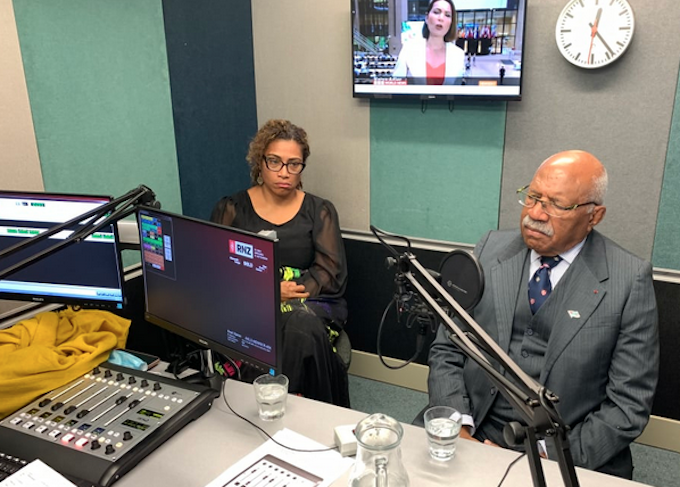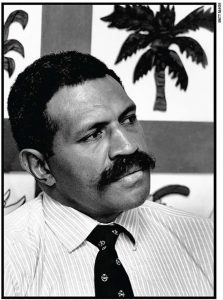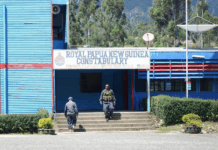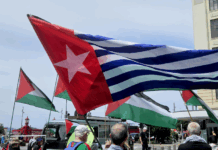
Sitiveni Rabuka is infamous for making Fiji a republic after carrying out a military coup 35 years ago by overthrowing an Indo-Fijian dominated government to help maintain indigenous supremacy.
Rabuka has been a central figure in Fijian politics since 1987 — as the nation’s first coup maker, a former prime minister, most recently the leader of opposition, and now a reformed Christian and politician, and the leader of the People’s Alliance Party.
The former military strongman has positioned himself as the chief rival of the country’s incumbent Prime Minister Voreqe Bainimarama — a former military commander and coup leader himself — as Fijians prepare to head to the polls at some stage later this year.
- LISTEN TO RNZ PACIFIC WAVES: Sitiveni Rabuka’s vision on Fiji’s future
- The media and the coup leader: Sitiveni Rabuka – Pacific Journalism Review
- Other Fiji election reports

Rabuka, now 73, is on a campaign trail in Aotearoa New Zealand on a mission — to share with the Fijian diaspora how “politics will affect their relatives” back at home and raise funds for his campaign to topple Bainimarama’s FijiFirst government.
In an exclusive interview with RNZ Pacific’s senior journalist Koroi Hawkins, he spoke about his vision for a better Fiji, raising the living standards of the Fijian people, and why he is the man to return the country back to “the way the world should be.”
“I’m here to talk to the supporters who are here,” Rabuka said.
“We do not have a branch in New Zealand so most of our supporters here have not formed themselves into a branch or into a chapter and I’m just out here to talk to them. They’ve been very supportive on this journey and that’s why I’m here.”
Koroi Hawkins: Why is it important to be talking to people outside of Fiji for the elections?
Rabuka: It is very important to speak to the diaspora. Some of them are now [New Zealand] citizens and may not vote. But they have relatives in Fiji and politics will affect their relatives. It is good for them to know how things are, and how things could turn out if we do not have the change that we advocate.
KH: Is there a fundraising aspect to this overseas election campaigning as well?
Rabuka: That is also the case. Fiji is feeling the impacts of covid-19 and also the rising food prices and the reduction of employment opportunities, hours at work and things like that, has reduced our income earning capacities and so many of us have been relying on government handouts, which is not healthy for a nation. We would like to encourage people to find out their own alternative methods of coping with the crisis that we are now facing, health and economic, and also to communicate those back to those at home.
We are also here to thank the people for the remittances of $1.5 billion [that] came into Fiji over the last two years, and a lot of that came from New Zealand, Australia and America. We were grateful to the three governments of the United States of Australia and New Zealand for hosting the diaspora.
KH: One of your strongest campaign messages has been about poverty with estimates around almost 50 percent of Fijians are now living in hardship. How do you propose to deliver on this promise?
Rabuka: Those are universal metres that I applied and for Fiji it can be effectively much lower if we were to revert to our own traditional and customary ways of living. Unfortunately, many of the formerly rural dwellers have moved to the urban centres where you must be earning to be able to maintain a respectable and acceptable way of life and living standards and so on.
Those surveys and the questions were put out to mostly those in the informal settlement areas where the figures are very high. It is true that according to universal metres and measures, yes, we are going through very difficult times. And the only way to do that is to give them opportunities to earn more. Those that are living in the villages now can earn a lot more. Somebody sent out a message this morning, calculating the income per tonne of cassava and dalo; it is way more than what we get from sugar in the international market.
KH: This pandemic, it’s really exposed how dependent Fiji is on tourism. This really hit Fiji hard. What is your economic vision for Fiji?
Rabuka: We just don’t want to be relying totally on one cow providing the milk. We will need to be looking at other areas. We have to diversify our economy to be able to weather these economic storms when they come because we cannot foresee them. But what we can do is have something that can weather whatever happens. Whether it is straightforward health or effects of wars and crises in other parts of the world. Agriculture and fisheries and forestry, when you talk about these things it also reminds us of our responsibilities towards climate change. We have to have sustainable policies to make sure these areas we want to diversify into do not unfairly hurt the areas that we are trying to save and sustainably used when we consider climate change.
KH: Talking about agriculture, the goal seems to be always import substitution and attempts to do that so far have been mild. Even downstream processing also seems problematic. Are there any specific ways you see food for agriculture other than the things that have been tried not just in Fiji, but around the region that are not really taking a hold in a lot of Pacific countries?
Rabuka: I think it is the choices we have made. There is a big opportunity for us to go into downstream processing of our agricultural produce and use those to substitute for the imports we get. If you look at the impact on the grain market in the world as a result of the Ukrainian war. What else can we have in Fiji now or in other countries that can substitute the grain input into the diet. So those are the things that we need really need to be doing now.
There has been a lot of research done at the Koronivia Research Station and they are laying there in files stored away in the libraries and the archives. We need to go back to those and see what has been done. Very interesting story about the former the late president Ratu Sir Penaia Ganilau when he went to Indonesia and he found a very big coconut. He wanted to bring that back to go and plant in Fiji and the people were so embarrassed to tell him that this thing was a result of research carried out in Fiji.
KH: Another big issue is education. We have heard a lot about student loans. You have talked about converting student loans to scholarships and forgiving student debt. Can you maybe speak a little bit more about that that promise? What exactly is that?
Rabuka: We would like to go back to the scholarships concept, enhance the education opportunities for those that are that are capable of furthering the education and also branching out or branching back into what has been dormant for some time now that TVET, technical and vocational education and training. Those are the things that we really need to be doing. Lately, there have been labour movement from Fiji to Australia, New Zealand, for basic agricultural processes of just picking up nuts and fruit and routes.
Those people who are coming out are capable of moving on in education to being engineers and carpenters and block layers and if they had the opportunity to further to go along those streams in in the education system. There is no need for them to be paying. The government really should be taking over those things that we did in the past. We cannot all be lawyers and accountants and auditors and doctors and pilots and so on. But there is so many, the bigger portion of the workforce goes into the practical work that is done daily.
KH: Just going back to the current student debt that is there. Would your policy be to forgive that debt? Or would you still be working out a way to recover it?
Rabuka: That would be part of our manifesto and we are not allowed to announce those areas of our manifesto without giving the financial and budgetary impacts of those.
KH: If you did become prime minister, you would be inheriting a country with the highest debt to GDP ratio that Fiji has ever seen is what the experts are saying. What would be your thoughts coming into that kind of a problematic situation?
Rabuka: We would have to find out how much is owed at the moment and if we were to forgive that, what does forgiving that mean? It means you forego your revenue that you are going to get from these students who are already qualified to do work and for them it means getting reduced salaries when they start working so that they can pay off loans. We have to look at all the combinations and find out which is the most, or the least painful way, of doing it.
It is not their fault. It is what the new government will inherit from the predecessors. Everybody will have to be called upon to tighten their belt, understand the situation, everybody getting a very high per capita burden of the national debt and tell them just how it is. [This is] where we are, this is how we have to get out of it and everybody needs to work together. That is why we need a very popular government. And that is why all the political parties are working very hard to get that support from the people.
KH: Turning to the politics. In 2018, you came within a millimetre of that finish line. Since then, a lot has changed. You ran with the Social Democratic Liberal Party (Sodelpa) at the time. You have now formed your own party, the People’s Alliance. How confident are you about this election race given all those changes?
Rabuka: I think I am confident because there is a universal cry in Fiji for change. The people are looking for their best options on who is to bring the change, what sort of combinations, who are the people behind the brand, people with records in the private sector, also in politics and in the public sector, people who are who are determined to stay on Fiji and do what needs to be done.
There are so many overseas now who love Fiji so much. So many other people who could have been there in Fiji with us running the campaign in order to create a better Fiji, who are overseas. They have not been able to come freely back and with those in mind, we are determined to be the change and bring the change.
KH: One of the things you have talked about is reforming the Fiji Police Force. There has been documented history of problems within the police force. How would you plan to achieve that?
Rabuka: Just bring back the police in Fiji to be the professional body of law enforcement agencies that they had been in the past. We have the capacity, we have the people, we have the natural attributes to be good policemen and women. Get them back to that and avoid the influence of policing in non-democratic societies or the baton charge in every situation, putting it in an extreme term. But that is the sort of thing that we are beginning to see.
We have to reconsider where we send our police officers for training. They must be trained in regimes, in cities, and in countries and governments where we share the same values about law and order, about respecting the rights of citizens, having freedoms. Nobody is punished until they have been through the whole judicial system. You cannot punish somebody when you are arresting them.
KH: There has been a lot of work to try and improve things in policing in the Pacific. But there is a culture that persists, that this history of sort of brutality and “us and them” kind of mentality. How would we get past that in our policing?
Rabuka: We are still coming out of that culture. That was our native culture. We still have to get away from it into modern policing. You look at the way the tribal rules were carried out from that. Somebody’s offended the tribal laws, tribal chiefs, one solution: club them. We have to get away from that. And when we don’t concentrate on moving forward, we very easily fall back.
KH: What [would] a coalition with the National Federation Party look like?
Rabuka: We are going to form a coalition. It will be a two-party government. The Prime Minister is free to pick his ministers from both parties and the best qualified will be picked.
KH: Looking at your own political journey. It started very strongly pro-indigenous Fijian focus. Even with your evolution to your current standing, there are some non-indigenous Fijian voters who are unsure what the future would look like with you as prime minister. What is your message to these people about what Fiji will be like for them and under your prime ministership?
Rabuka: Well, it is like you see the cover of the book and now you are reading the book. I have a dream of what the Pope [John Paul II] saw when he came to Fiji; the way the world should be, a multiracial, vibrant society, where everybody is welcome, where everybody is contributing, everybody is going by their own thing and even unknowingly contributing to a very vibrant economy that will grow and grow and grow so that we are equal partners in the region with Australia, New Zealand, and a very significant part of the global economy.
This article is republished under a community partnership agreement with RNZ.














































